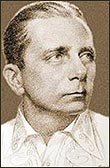|
j
a v a s c r i p t |
Pg.2/4
March 19, 1945
Hans Menzi
"You know in Calamba..." began Hans, he was captured wearing a Japanese soldier's uniform and interrogated for nine days. He got out by telling the Japanese that he was a Japanese mestizo (Japanese mother and Philippine-born Spanish father). It's a good story but there's just one problem: Hans is pale white and completely blonde — a perfect Nordic specimen if ever there was one. Incidentally, when Hans arrived, Maurice greeted him with "Say, congrats Hans, I hear you're a Major now." "Oh," replied Hans quickly, "but I'll be a Lt. Colonel soon" — just like that. Dunckel promised to make him a Colonel and couldn't, so he's going to do it by degrees. . . . . From where I'm writing, I can see the skeleton of the tower of what was once the Tondo Church in the lower part of northwest Manila. American artillery blasted the Church after a spotter plane saw a Japanese position on its steps. The parish priest, Father De Guzman, told me that the Japanese had placed two machine guns there to cover the church and plaza. Terrified of being gunned down, people sheltering in the church didn't dare flee the raging fires around them. Some eventually made a run for it when the flames forced the Japanese to withdraw a bit, but others stayed put until the priests — wet towels on their faces — led them out of the burning church. The Japanese, busy preparing explosives nearby, drove them back in with a couple of grenades. The entire flock managed to escape that Monday night (February 5) before the fires consumed the whole sector. . . . . I bicycled to New Manila this afternoon to interview Juan Talambiras — a well-respected, venerable old Greek with a Moses-like white beard. His home was at 1174 M.H. del Pilar, almost opposite the old Syquia Apartments. When he saw the Japanese put "torpedoes" there, he moved to the Stilianopoulos home near the new Syquia Apartments. When the Japanese got tough there, he returned home only to find that a shell had landed in his front porch! And there he stayed, unfazed by either Japanese sentries or shells, until the fires threatened his home. He dismissed the danger with a single sentence: "Shells and bullets were raining about this time." Once he marched up two streets just to see what a fire was all about. He had to know, he said, because the wind was blowing in his direction. Juan never had a shelter — and he got his sleep too. |